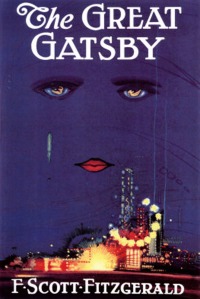Title: The Great Gatsby
Author: F. Scott Fitzgerald
Genre: Classic
Trigger Warnings: Antisemitism (subtext, not explicit), racism/Nazi ideology, car crash, alcohol use, blood, death, gore (brief), infidelity, gun violence
Back Cover:
The Great Gatsby, F. Scott Fitzgerald’s third book, stands as the supreme achievement of his career. This exemplary novel of the Jazz Age has been acclaimed by generations of readers. The story is of the fabulously wealthy Jay Gatsby and his new love for the beautiful Daisy Buchanan, of lavish parties on Long Island at a time when The New York Times noted “gin was the national drink and sex the national obsession,” it is an exquisitely crafted tale of America in the 1920s.
The Great Gatsby is one of the great classics of twentieth-century literature.
Review:
I read this for the first time in high school and absolutely hated it. Loathed it, in fact. I remember it most vividly for having to write a paper about the motif of the eyes of Dr. T.J. Eckleberg without understanding what a motif even was. There was no plot, the characters were all awful people, my fundamentalist Christian sensibilities were put off by all the infidelity, and I didn’t understand why anyone wanted to read to the end, let alone liked it enough to call it a classic.
But my husband considers it one of his favorite books, and ever since I read The Chosen and the Beautiful and didn’t hate it, he’s been suggesting that I give this one another chance. I agreed, mainly because the audiobook was short and immediately available at the library.
This time around, I didn’t hate it. I can’t say that I particularly liked it, but at least now I can see why it became a classic (and why my husband loves it so much).
This book is deceptively short for how complex it is. If you read it on the surface (which is how I read it in high school because I didn’t know any other way to read), it’s a boring story of rich people being rich and bored and having affairs and throwing ridiculous parties. It’s also a rare example of the narrator and the protagonist being different characters – Nick Caraway narrates the story, but his role is an observer to what happens to the protagonist, Jay Gatsby, and I did not know what to do with that in high school.
The Great Gatsby, like every classic book I’ve read, has Important Themes. Its main theme is that you can’t recapture, relive, or undo the past – you just have to grieve what you’ve lost and move on, or trying to bring back the past will destroy you and probably other people as well. Jay Gatsby loved Daisy, but he went off to fight in World War I and Daisy married someone else instead. Gatsby’s whole motivation is to get Daisy back, to bring back what they had when she was a rich teenager and he was a penniless young soldier but they were deeply in love, and to convince, gaslight, or force her feelings to be the same as his. Which to me says that he doesn’t love her as a person now, if he ever did, he just sees her as an object of his desire that he can possess, just like all the fancy things in his house.
There are also a lot of poignant, quotable lines in this book, several of which I’ve heard before without knowing they were from this book.
As far as entertainment goes, I did not enjoy this book. There’s no plot, the characters are all horrible people, and from a story perspective I found it pretty boring. But it does have some things of value to say theme-wise, so at least now I understand why it became a classic – even if I still don’t like it as much as my husband does.

